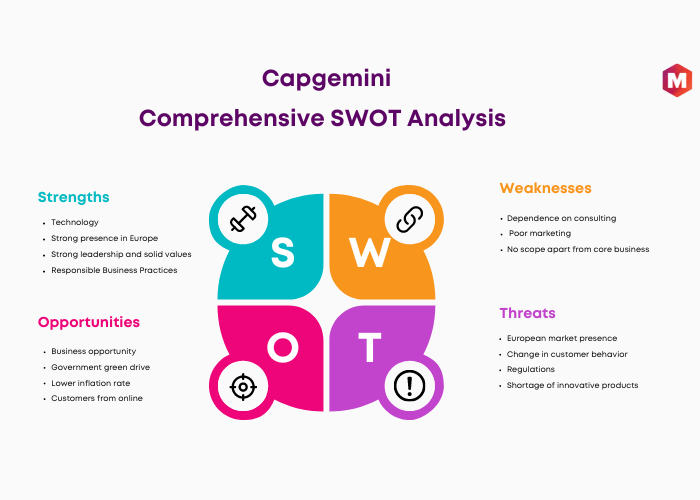Let’s explore the SWOT analysis of Capgemini by understanding its strengths, weaknesses, opportunities, and threats.
Capgemini is a French technology services company formed in 1967 and headquartered in Paris, France. Capgemini provides IT services and is one of the world’s largest IT consulting, professional services, and outsourcing Service Companies. The company has about 200,000 employees in over 400 countries.
Capgemini’s various services are delivered through four main disciplines: technology, consulting, local professional services, and outsourcing. Capgemini enables the organization to understand its business ambitions through many services, from strategy to operations. It is driven by the belief that the business value of technology is derived from and by the people. It provides an integrated service that combines top technologies with sector expertise.
Capgemini maintains a noticeable position in the IT market by carefully having its SWOT analyzed and reviewed to perform better. Let us discuss the SWOT analysis of Capgemini.
Overview of Capgemini:
- Industry: Information technology, Consulting, Outsourcing
- Founded: October 1, 1967, 56 years ago
- Founder: Serge Kampf
- Headquarters: Paris, France
- Area served: Worldwide
- Key people: Aiman Ezzat (CEO), Paul Hermelin (Chairman of the Board)
- Revenue: €22.5 billion (2023)
- Operating income: €2.34 billion (2023)
- Net income: €1.66 billion (2023)
- Total assets: €27.30 billion (2023)
- Total equity: €3.7 billion (2023)
- Number of employees: 337,000 (2023)
- Website: www.capgemini.com
Table of Contents
SWOT analysis of Capgemini
Strengths of Capgemini
1. Technology
The company’s main strength is providing concrete results for technology-oriented people. It provides the right solutions to bridge IT and business. It works with diversified technology to meet business goals.
2. Strong presence in Europe
Capgemini has a strong presence in the European market. This enables the expansion of the suitable shoe model. Capgemini’s right shore model focuses on cost reduction, business value, and the ability to outsource IT operations.
3. Strong leadership and solid values
Capgemini’s strong leadership and solid values are the foundation of their business. The company’s core values – boldness, honesty, freedom, trust, team spirit, modesty, and fun provide the basis of rules of conduct within the team.
4. Responsible Business Practices
Capgemini’s code of ethics is more than the abstract ideas. It is a formalization of the longstanding commitment to ethical behavior that shapes the business practices at each company level.
5. Employee strength
The company has about 145,000 employees working in its organization and a global presence in about 40 countries.
6. Domain expertise
Capgemini has strong domain experience in government, manufacturing, energy and utilities, and financial and telecom expertise.
7. Strong brand portfolio
Capgemini has invested a lot in building a strong brand portfolio. This is important when it expands to new categories.
Weaknesses of Capgemini
1. Dependence on consulting
Capgemini has a high dependence on consulting. It is not so popular about the service project. Their capacity to deal with the service project is slightly less than that of their competitors.
2. Poor marketing
Even though the product becomes a hit concerning sales terms, its position and selling proposition are unclear. This is a significant drawback of its competitors.
3. No scope apart from core business
Although Capgemini is a leading organization in the IT segment, it has seen a lot of challenges in moving towards other domains due to its current culture.
Opportunities of Capgemini
1. Business Opportunity
Capgemini plays an essential role in today’s business. Their main domains, like networking and cloud computing, are the most prominent areas for growth, and they see an opportunity for Capgemini to shine.
2. Government green drive
The government green drive is an excellent opportunity for the state and federal government contractors to procure Capgemini products.
3. Lower inflation rate
The low inflation rate brings more stability to the market, enabling credit at lower interest rates to the customers of Capgemini.
4. Customers from online
Over the years, Capgemini has invested considerably in the online platform. This has provided a new channel for sales. This helps them grow their business further.
Threats of Capgemini
1. European market presence
A strong presence in the European market is a significant threat as they are undergoing economic disorder. This is a limitation in their business growth.
2. Change of customer behavior
Changes in customer behavior through the online channel can threaten the existing physical infrastructure-driven supply chain model.
3. Regulations
New environmental regulations imposed in the Paris Agreement can affect a few existing product categories of Capgemini.
4. Shortage of innovative products
Ever since its formation, the company has developed many products often developed by other competitors. New innovative products are not regular from the company, which leads to high and low swings in sales.
5. Tough competitive market
The IT market sees many emerging payers focusing on low-cost value propositions.
Conclusion
Capgemini is a powerful player in the IT business, with substantial technical solutions and a significant presence throughout Europe. While it faces constraints such as dependency on consulting and market competition, cloud computing and online platforms offer possible growth opportunities.
Capgemini must innovate and adapt to changing business and technology landscapes to sustain its global leadership, leveraging its strengths to overcome industry threats and seize new opportunities.
Liked this post? Check out the complete series on SWOT


